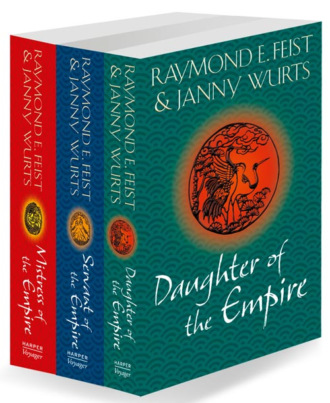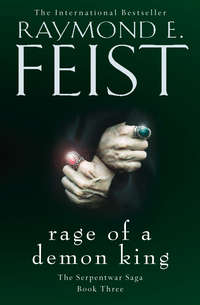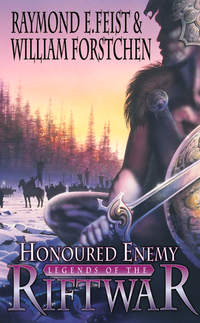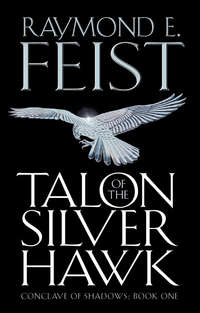
Полная версия
The Complete Empire Trilogy: Daughter of the Empire, Mistress of the Empire, Servant of the Empire
Papewaio beckoned the man from the ranks, and out of Mara’s hearing they spoke quietly for several minutes. After an animated interval the bandit broke into a broad grin, and the Strike Leader turned to his mistress with a deferential bow. ‘My Lady, this is Toram. His uncle was cousin to a man who married a woman who was sister to the woman who married my father’s nephew. He is my cousin, and worthy of service to the Acoma.’
Mara hid a smile behind her sleeve. Pape and the obviously clever Toram had seized upon a simple fact of Tsurani culture. Second and third sons of soldiers by tradition were free to take service with houses other than those in which they were born. By treating this grey warrior as if he were a youth, Papewaio had circumvented Lujan’s question of honour entirely. When Mara had recovered her decorum, she said simply, ‘Pape, call your cousin into our service, if he is willing.’
Papewaio caught Toram’s shoulder in brotherly fashion. ‘Cousin, you are called to serve the Acoma.’
The man raised his chin with newfound pride and crisply announced his acceptance. ‘I will come!’
His words touched off a rush among the outlaws, as men crowded around the dozen Acoma soldiers and begun exchanging the names of relations. Again Mara fought down a smile. Any Tsurani of noble birth, or any soldier, knew his bloodlines back several generations, as well as cousins, aunts, and uncles, most of whom he knew by name only. When two Tsurani met for the first time, an elaborate inquiry after the health of relatives began, until histories were exchanged and the two strangers knew who stood higher upon the social ladder. It was almost impossible that, after sufficient conversation, some tenuous relationship would not be discovered, allowing the grey warriors to be called to service.
Mara allowed Papewaio to offer his hand so she might step down from the wagon. Bandits gathered in knots around different soldiers, happy voices shouting out questions and answers as relationships were determined. Lujan shook his head in wonder and faced Mara, his eyes alight with poorly masked emotions. ‘My Lady, your ruse to capture us was masterful and … alone would have made me proud to serve you. This …’ His hand waved at the milling, excited men. ‘This is beyond understanding.’ Nearly overcome by his feelings, he turned away a moment, swallowed hard, then looked back at Mara, his face again a proper Tsurani mask, though his eyes were shining. ‘I do not know if … it is right, but I will take service gladly, and I will make Acoma honour mine. My life will be yours as you will, my Lady. And should my life be short, it will be a good life, to again wear house colour.’ He straightened, all trace of his rakishness put aside. He studied Mara for a long moment, his eyes locked with hers. The words he spoke then impressed her ever afterward with their sincerity. ‘I hope fate spares me death for many years, mistress, that I may stay near your side. For I think you play the Game of the Council.’ Then with a near loss of self-control, moisture gleamed in his eyes and his face split in a grin. ‘And I think the Empire will never be the same for it.’
Mara stood silent, while Lujan bowed and moved away to compare relations with the Acoma soldiers and find common kin, no matter how distant the tie. Then, with Keyoke’s permission, he sent runners to camp to call the rest of his following to the spring. The latecomers arrived in varying states of disbelief. But when they saw the Lady seated upon the thyza wagon as though she held court in the pillared shade of her estate hall, their scepticism lost impetus. Convinced in the end by the exuberance of comrades already sworn to Acoma service, they recited lists of cousins and in-laws until they, too, had regained the honour of house service.
Afternoon passed, the trees above the rim of the ravine striping the clearing with lengthened shadows. The heat lessened and the late breezes bore a woodsy scent, as the branches above the caravan rustled restlessly. Satisfied with the events of the day, Mara watched a flock of gauguin birds swoop down to feed upon insects blown along by the breeze. As they finished their meal and sped raucously off to the south, she realized how tired and hungry she was.
As though thinking in concert with her, Keyoke paused by Mara’s side. ‘Lady, we must leave directly if we are to reach your estate by nightfall.’
Mara nodded, longing now for soft cushions in place of rough bags of thyza. Weary as she was of the stares of hungry men, the privacy of her litter seemed suddenly inviting. Loudly enough for the men to hear, she called, ‘Let us be away, then, Force Commander. There are Acoma soldiers here who would like a bath, a hot meal, and rest in a barracks where the fog won’t dampen their blankets.’
Even Mara could not keep her eyes free of moisture at the shout of unalloyed joy that sprang from the lips of the bandits. Men who so recently had stood ready to fight against her now were eager to defend her. Silently the girl gave thanks to Lashima. This first victory had come easily; but against the strength of the Minwanabi, and the scheming cleverness of the Anasati, in the future her success would come with difficulty, if at all.
Jostled back against the cushions as her slaves raised her litter, Mara felt limp. She allowed herself a deep sigh of relief. All the doubt and fear suppressed through armed confrontation and negotiation with the bandits surfaced behind the privacy of her curtains. Until now she had not dared admit how frightened she had been. Her body quivered with unexpected chills. Aware that dampness would mar the fine silk of her gown, she sniffed and suppressed a maddening urge to weep. Lano had ridiculed her emotional outbursts as a child, teasing her about not being Tsurani – though women were not expected to hold themselves in check the way men did.
Remembering his laughing banter and the fact that she had never seen her father betray any uncertainty, any doubts or fears, she closed her eyes, immersing herself in an exercise to calm herself. The voice of the teaching sister who had schooled her at the temple of Lashima seemed to answer within her mind: learn the nature of self, accept all aspects of self, then the mastery can begin. Denial of self is denial of all.
Mara sniffed again. Now her nose dripped also. Pushing her sleeves out of harm’s way, she silently admitted the truth. She had been terrified, most so at the moment she had thought the bandits might be attacking her estates while she futilely searched the hills for them.
Again Mara scolded herself: this is not how a Ruling Lady acts! Then she understood the root of her feelings: she didn’t know how a Ruling Lady was expected to act. Lacking any schooling in governance, she was a temple girl thrust into the deadliest contest in the Empire.
Mara reviewed an early lesson from her father: doubts could only cripple one’s ability to act decisively; and in the Game of the Council, to hesitate was to die.
To avoid dwelling on weakness, Mara peered through a crack in the curtains at the newly recruited Acoma retainers. Despite soiled clothing, haggard faces, arms like sticks, and eyes of frightened animals, these men were soldiers, yet now Mara recognized a quality in them she had failed to see before: these outlaws, even the roguish Lujan, had been just as frightened as she. Mara found that perplexing, until she reconsidered the ambush from their perspective. Despite being outnumbered, the Acoma warriors were all battle-tested soldiers, properly armed and fit. Some of these grey warriors hadn’t seen a decent meal in a year. And their weapons were an odd assortment of discarded, stolen, or crudely fashioned swords and knives. Only a few had anything like a shield and none wore body armour. No, thought Mara, many of those sad, desperate men must have expected some of their unfortunate brotherhood to die this day. And each would have wondered if he’d be among that number.
The men marched unaware of their mistress’s observation. Their faces revealed a play of other emotions, among them hope and the fear of false hope. Mara sank back upon the cushions, absently focusing on the colourful design of the litter’s tapestry covering. How had she suddenly come to see all these things in these men’s faces? Could her fear have triggered some perceptiveness she had not understood within herself? Then, as if her brother, Lanokota, sat beside her, memory of his presence filled her mind. If she closed her eyes she could hear him whisper, ‘You are growing up, little sister.’
Suddenly Mara could no longer contain her tears. Now her weeping did not arise from sorrow but from a jubilant upwelling similar to the joy she had known when Lano had last won the summer games in Sulan-Qu. On that day Mara and her father had cheered like peasants from the stands, for a time unconcerned with the mores of social status and decorum; only now her emotions swept her tenfold more powerfully.
She had won. She had tasted her first victory in the Game of the Council, and the experience whetted her wits, left her yearning for something more and greater. For the first time in life she understood why the great Lords strove, and even died, for the chance to gain in honour.
Smiling through the tracks of tears, she allowed the motion of the litter to relax her body. No one she faced across the invisible gaming table of Tsurani politics would know of this move, at least not directly and not for some time. But where Minwanabi treachery had reduced the Acoma home garrison to fifty soldiers, she now commanded the loyalty of better than two hundred. Since grey warriors were scattered in hideouts the breadth of the Empire, she could employ these men to recruit more. Should she gain but another week from her sending the box with the feather and cord to the Lord of the Minwanabi, then she might have five hundred or more soldiers to offset his next threat. Mara felt joyous. She knew victory! And two voices arose from memory. On one hand the teaching sister said, ‘Child, be wary of the lure of power and triumph, for all such things are transitory.’ But Lano’s impetuous voice urged her to appreciate her accomplishments. ‘Enjoy victory while you can, Mara-anni. Enjoy it while you can.’
Mara lay back, tired enough to set her mind at rest. As her slaves bore her homeward through the deepening shadows of sundown, she smiled slightly in the privacy of her litter. While she knew that her situation was still almost hopeless, she was going to take Lano’s advice. Life must be savoured while it lasted.
The wagon wheels creaked and turned and the needra snorted, while the dust of tramping men turned the air ochre and gold. Sunset faded slowly to twilight as Mara’s unlikely caravan with its ill-assorted company of men-at-arms made its way down the road to the Acoma estate.
The torches by the main door of the estate house lit a courtyard thrown into confusion. The earlier arrival of the formerly masterless workers and farmers has busied Jican and his staff to the exclusion of all else, as meals and quarters and jobs were meted out to all. When Mara’s caravan returned on the edge of nightfall with Lujan’s ragged, underfed warriors, the hadonra threw his hands in the air and begged the gods for an end to an impossible day’s work. Hungry himself, and by now resigned to a tongue-lashing from his wife for missing his children’s bedtime, Jican dispatched word to the cooks to prepare yet another cauldron of thyza, and to cut cold meat and fruit. Then, shorter than most of his charges and having to make up the difference by being tirelessly energetic, the hadonra began the task of taking names and tallying which men needed clothing, and which sandals. While Keyoke began the task of sorting the newcomers into companies, Jican and his assistants assembled a team of slaves to sweep out an empty barracks and fetch blankets for sleeping mats. Without formal instructions from anyone, Lujan took on the role of officer, reassuring or bullying where necessary to help get his company settled.
Into this chaos of milling men and needra wagons sailed Nacoya, her hairpins askew in her agitation. She gave Lujan’s raffish company a brisk glance and homed in at once on Mara’s litter. Weaving a determined path through the press, she arrived just as Papewaio assisted his Lady from the cushions to her feet. Stiff from sitting and dazzled by the torchlight, Mara observed that silent moment when her Strike Leader surrendered her care to Nacoya. The invisible line between the domains of bodyguard and nurse lay approximately where the stone walk from the main doors of the house touched the roadway.
Nacoya accompanied her mistress back to her quarters, one step behind her shoulder as was proper. Once through the door, the old nurse gestured for the maids to withdraw. Then, her expression obscured by the wavering shadows cast by the oil lamps, she slid the screen firmly closed.
As Mara paused to remove the layers of bracelets and jewellery she had worn to seem frivolous throughout her ruse, the nurse addressed her with flint in her voice. ‘What is this sudden return? And who are all those ragged men?’
Mara tossed a brooch and jade necklace into a coffer with a rattle. After tension, and danger, and the intoxicating euphoria of success, the nurse’s peremptory manner set her teeth on edge; keeping firm rein on herself, she twisted off her rings one by one and related in detail the plan she had executed to replenish the Acoma garrison.
As the last ornament fell with a click into the pile, Nacoya’s voice rose. ‘You dared stake the future of the Acoma on so ill-conceived a plan? Girl, do you know what you risked?’ Mara turned to face Nacoya and found the nurse’s face reddened and her hands clenched. ‘Had one of those bandits struck a blow, your men would have died defending you! And for what? So that a scant dozen warriors would remain to defend the empty shell of this house when the Minwanabi came? Who would have defended the natami? Not Keyoke or Papewaio. They would have died!’ Near-hysterical with anger, the old woman shook. ‘You could have been used by every one of them! You could have been killed!’
Nacoya’s voice rose in pitch as if she was unable to contain her anger. ‘Instead of this … reckless adventure … you … you should have been deciding upon an appropriate marriage.’ Reaching out, Nacoya grabbed Mara’s arms and began to shake her, as if she were still a child. ‘If you continue in your headstrong foolishness, you’ll find your prospects limited to the son of some wealthy fertilizer merchant looking to buy a name for his family, while cut-throats and needra thieves guard your estate!’
‘Enough!’ Startled by the hardness of her own voice, Mara pushed the old woman away; and the sharpness of her manner cut through Nacoya’s tirade as a scythe cuts through grass. The old woman bit off her protests. Then, as she seemed on the verge of speaking again, Mara said, ‘Enough, Nacoya.’ Her tone was low and deadly, barely masking her anger.
Mara faced her old nurse. She stepped forward until scant inches separated them and said, ‘I am the Lady of the Acoma.’ The statement reflected little of the ire of the moment before; softening faintly, Mara studied the face of the woman who had raised her from childhood. Earnestly she said, ‘Mother of my heart, of all who serve me, you are most loved.’ Then her eyes narrowed and fire returned to her words. ‘But never forget for an instant you serve me. Touch me like that, address me in such a manner again, Nacoya – ever – and I will have you beaten like a kitchen slave. Do you understand?’
Nacoya wavered an instant and slowly bowed her ancient head. Wisps of loosened hair fluttered at the nape of her neck as she stiffly knelt before Mara until both old knees rested upon the floor. ‘I beg my mistress’s forgiveness.’
After an instant, Mara bent forward and put her arms around Nacoya’s shoulders. ‘Oldest and dearest companion, fate has changed our roles. Only days ago I was novitiate in the temple and you were my teacher and mother. Now I must rule over you, even as my father did. You serve me best by sharing your great wisdom. But in the end I alone must choose which path to follow.’
Hugging the trembling old woman close, Mara added, ‘And should you doubt, remember that I was not captured by bandits. Pape and Keyoke didn’t die. I chose well. My plans succeeded, and now we gain back some of what was lost.’
Nacoya was silent, then whispered, ‘You were right.’
Mara released the old woman and clapped her hands twice. Maids hurried in to tend their mistress while the old nurse rose from the floor. Shaking still from her reprimand, Nacoya said, ‘Lady, have I permission to withdraw?’
Mara lifted her chin as a maidservant began unfastening the collar of her robe. ‘Yes, old one, but attend me after I bathe. We have much to discuss. I have given much thought to what you’ve advised. The time has come for me to make arrangements for marriage.’
Nacoya’s dark eyes opened wide. On the heels of Mara’s sudden wilfulness, this concession came as a total surprise. ‘Your will, my Lady,’ she said. She bowed and departed, leaving the maids to their work. In the dimness of the corridor the old woman straightened her spine with relief. At last Mara had come to accept her role as Ruling Lady. And while the vehemence of Mara’s rebuke had stung sharply, the release of responsibility for a child who must manage the honour of her ancestors brought a sense of profound satisfaction. The old nurse nodded to herself. If prudence was not among Mara’s virtues, the girl at least had inherited her father’s astonishing boldness and courage.
An hour later the Lady of the Acoma rose from her bathing tub. Two maids wrapped her glistening body in towels while another restored the screens that partitioned the wooden tub from the rest of the sleeping quarters. Like all Tsurani great houses, the number and size of rooms were strictly a function of where and how screens and doors were placed. By sliding another screen door, Mara’s sleeping chamber could be reached from the study without leaving the central apartments.
The air was still hot. Mara chose the lightest of her silk robes, barely covering mid-thigh and almost transparent, with no heavy embroidery. The day had tired her greatly, and she wished for simplicity and relaxation. Later, in the cooler hours of late evening, she would don a longer, heavier outer robe. But in the presence of her maids, and Nacoya, Mara could enjoy the immodest but comfortable lounging robe.
At her Lady’s command a maid pulled aside a screen that opened onto a small section of the inner court garden, always available to Mara for reflection and contemplation. While a dozen servants could hurry on errands through the central courtyard of the house, the clever placement of screening shrubs and dwarf trees provided a cranny of green where their passing would not intrude.
Nacoya appeared as Mara seated herself before the opening. Silent, and showing signs of nervous exhaustion, the girl motioned for the nurse to sit opposite her. Then she waited.
‘Mistress, I have brought a list of suitable alliances,’ Nacoya opened.
Mara continued to stare out the door, her only movement a slight turning of her head as the maidservant in attendance combed out her long, damp hair. Presuming permission to continue, Nacoya unrolled the parchment between her wrinkled hands. ‘Mistress, if we are to survive the plots of the Minwanabi and the Anasati, we must choose our alliance with care. We have three choices, I think. We can ally ourselves with an old and honoured name whose influence has gone into decline. Or we can choose a husband from a family newly powerful and wealthy, but seeking honour, tradition, and political alliance. Or we might seek a family that would ally because your family’s name would add to some ambition of their own in the Great Game.’
Nacoya paused to allow Mara the chance to reply. But the young woman continued to stare into the gloom of the garden, the faintest of frowns creasing her brow. The maid finished with the combing; she bundled Mara’s hair into a neat knot, bowed, and withdrew.
Nacoya waited. When Mara still made no move, she cleared her throat, then opened the scroll with well-concealed exasperation and said, ‘I have ruled out those families who are powerful but lack tradition. You would be better served by a marriage to a son of a house that in turn has powerful allies. As this means possible entanglements with the allies of the Minwanabi and, especially, the Anasati, there are few truly acceptable houses.’ She looked again at Mara, but the Lady of the Acoma seemed to be listening solely to the calls of the insects that wakened into song after sundown.
As servants made rounds to trim the lamps, Nacoya saw that the frown had deepened upon Mara’s face. The old nurse straightened the parchment with a purposeful motion. ‘Of all those likely to be interested, the best choices would be …’
Mara suddenly spoke. ‘Nacoya. If the Minwanabi are the single most powerful house in the Empire, which house is the most powerfully politically connected?’
Nacoya pushed her list into her lap. ‘The Anasati, without question. If the Lord of the Anasati did not exist, this list would be five times as long. That man has forged alliances with more than half the powerful Lords in the Empire.’
Mara nodded, her eyes fixed upon the air as if it held something only she could see. ‘I have decided.’
Nacoya leaned expectantly forward, suddenly afraid. Mara had not even taken the list, let alone looked at the names Nacoya had dictated to the scribe. Mara turned and focused her gaze keenly upon Nacoya’s face. ‘I shall marry a son of the Lord of the Anasati.’
• Chapter Four • Gambits
The gong was struck.
The harmonics of its sound reverberated through the breadth of the great hall of the Anasati. Hung with ancient war banners, the room was thick with the smell of old waxed wood and generations of intrigue. The vaulted tiled roof hid shadows so deep the place was sombre even with candles lit. The hall itself swallowed echoes, to the point where the assembled courtiers and retainers, seated and waiting, seemed barely moving statues who made no sound.
At the head of a long, carpeted centre aisle, upon an imposing dais, sat the Lord of the Anasati in his formal robes of office. Beneath the tiered weight of his ceremonial headdress, perspiration glossed his forehead; his bone-thin features showed no trace of discomfort, though his attire was stifling in the heat of midday. A dozen sashes of scarlet and yellow restricted his breathing, while the bows that flared out like starched wings behind him bound his shoulders; each time he moved, servants were obliged to rush to his side and adjust them. In one hand he held a large carved wand, its origins lost in time, sign of his supremacy as Ruling Lord. Across his knees rested the ancient steel sword of the Anasati – a relic second in importance only to the family natami – handed down from father to son since the days of golden bridge and the Escape, when the nations first come to Kelewan. Now its weight bore down cruelly on old knees, an inconvenience he must endure along with all the other trappings of office while waiting for the upstart Acoma girl to arrive. The room was a veritable oven, for tradition dictated that all the screens must remain closed until the formal entry of the suitor.
Tecuma, Lord of the Anasati, inclined his head slightly, and his First Adviser, Chumaka, hurried to his side. ‘How long?’ the Lord whispered impatiently.
‘Quite soon, master.’ The loyal counsellor bobbed like a nervous rodent and elaborated. ‘The gong has rung thrice, as Mara’s litter reached the outer gate, while it entered the main house, and now as it passes through the gate to the courtyard. The fourth chime will sound when she is admitted to your august presence, Lord.’
Irked by stillness when he longed for music, the Lord of the Anasati said, ‘Have you given thought to what I asked?’
‘Of course, my Lord. Your wish is my desire. I have conceived of several appropriate insults to answer the Acoma bitch’s presumption.’ The adviser licked his lips and added, ‘To ask for your son Jiro as consort … well, that would be brilliant’ – the Lord of the Anasati shot his adviser a curious look, which caused his ritual gown to list left. Servants flocked to him and fussed until it was properly adjusted once again. Chumaka continued his comment – ‘Brilliant, if it had even the remotest hope of success. A marriage with any of your sons would bind you to the Acoma in an alliance. Not only would that deplete your resources to protect them, but then the witch could turn her full attentions to the Lord of the Minwanabi.’








